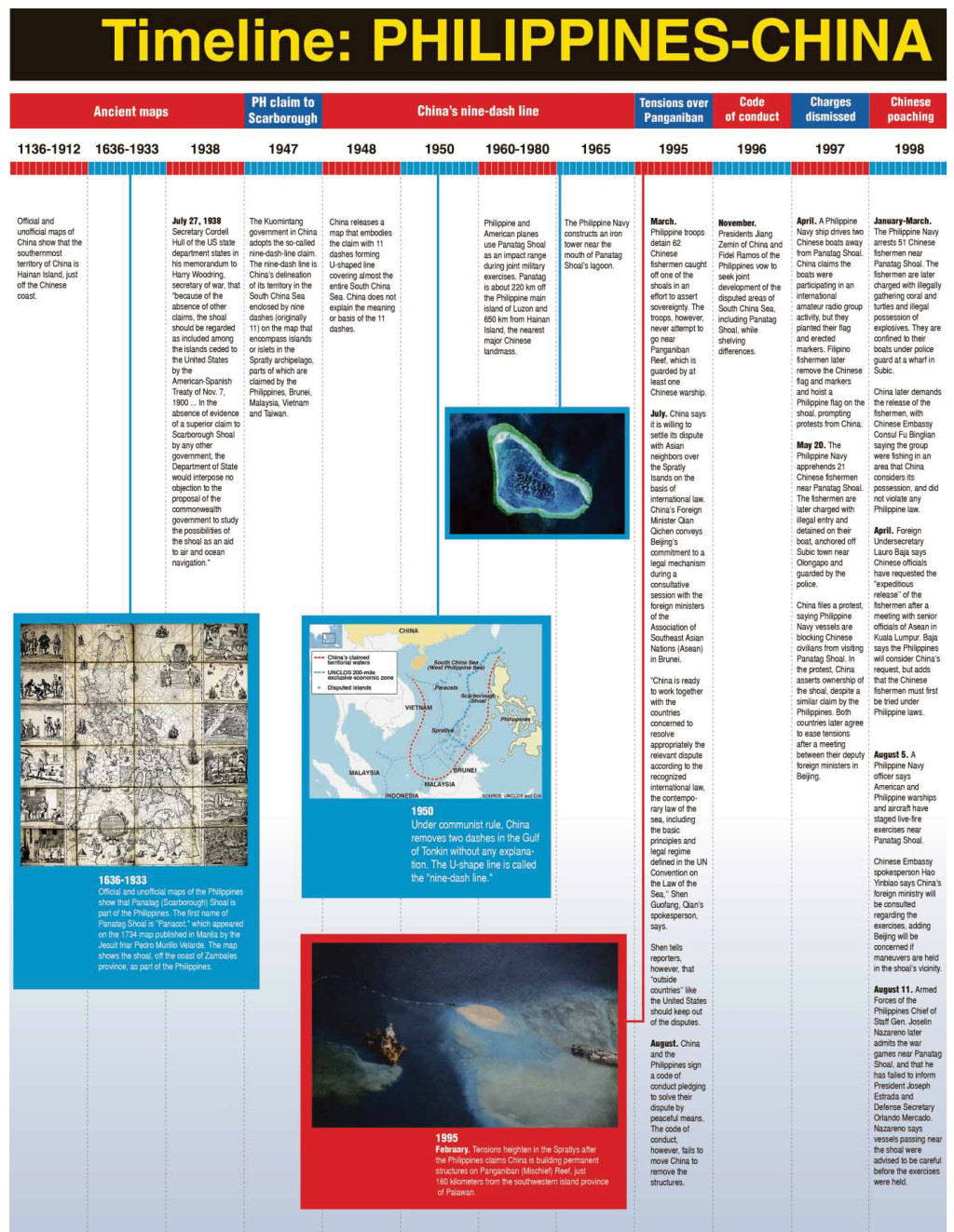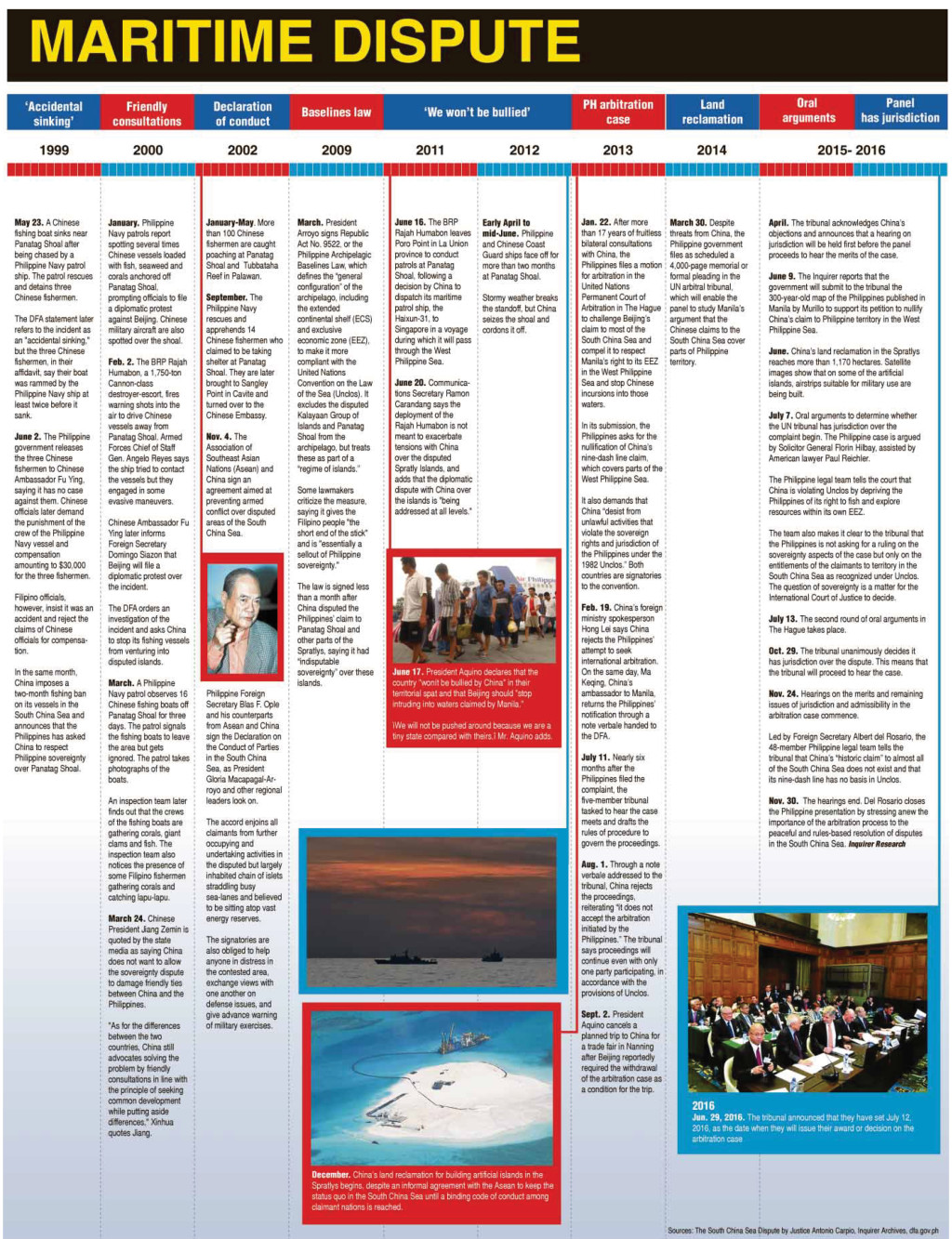Court junks China claims

AN INTERNATIONAL arbitration court ruled on Tuesday that China had no historic title over the South China Sea and that it violated the sovereign rights of the Philippines with its actions in the strategic waterway.
“China had violated the Philippines’ sovereign rights in its exclusive economic zone by interfering with Philippine fishing and petroleum exploration, by constructing artificial islands and failing to prevent Chinese fishermen from fishing in the zone,” the UN-backed Permanent Court of Arbitration in The Hague said in a statement after handing down its ruling on the case brought by the Philippines against China in 2013.
(Full text of ruling at https://inq.news/FullTextPHVsChina)
China claims almost all of the South China Sea, including waters within the exclusive economic zones (EEZs) of the Philippines and three other Southeast Asian countries—Brunei, Malaysia and Vietnam—and Taiwan.
To bolster its sweeping claims, China has built artificial islands on at least seven reefs in the Spratly archipelago, topping some of them with airstrips capable of receiving large military aircraft.
No legal basis
Finding for the Philippines, on a number of issues, the arbitral court said there was no legal basis for China to claim historic rights to resources within its so-called nine-dash line, which demarcates Beijing’s sweeping claims in the South China Sea.
The tribunal said that China’s claims of historic rights to resources in the South China Sea were incompatible with and extinguished by the exclusive economic zones provided for in the United Nations Convention on the Law of the Sea (Unclos), under which the Philippines brought the case.
It said China had interfered with traditional Philippine fishing rights at Panatag Shoal (Scarborough Shoal), located 210 kilometers from the coast of Zambales province, and had breached the Philippines’ sovereign rights by exploring for oil and gas near Recto Bank (Reed Bank) in the Spratly archipelago.
Both Panatag Shoal and Recto Bank are within the Philippines 370-km EEZ, known locally as West Philippine Sea.
None of China’s reefs and holdings in the Spratlys entitled it to an EEZ, the court ruled.

STREET CELEBRATION Breaking into loud cheers, a crowd of Filipinos and Vietnamese at Manila Bay hoist a giant Philippine flag on Tuesday to show their support for the unanimous decision of a UN-backed tribunal to junk China’s claim to almost all of the South China Sea, including waters in Manila’s exclusive economic zone known as West Philippine Sea. RICHARD A. REYES
“Having found that none of the features claimed by China was capable of generating an exclusive economic zone, the tribunal found that it could—without delimiting a boundary—declare that certain sea areas within the exclusive economic zone of the Philippines, because those areas are not overlapped by any possible entitlement of China,” the court said.
The ruling also covered the contentious issue of the definition of maritime features in the South China Sea and entitlements of the coastal nations surrounding those features.
“Features that are above water at high tide generate an entitlement to at least [22.2 km] territorial sea, whereas features that are submerged at high tide do not,” the tribunal said.
Militarization hit
The tribunal declared “unlawful” China’s military buildup and activities in the Spratlys, saying parts of the archipelago are within the Philippines’ EEZ.
It also considered the effect on the marine environment of China’s land reclamation and artificial island building in the Spratlys and found that China had caused severe harm to coral reefs and violated its obligation to preserve and protect fragile ecosystems and the habitat of depleted, threatened or endangered species.
It also found that Chinese authorities were aware that Chinese fishermen have harvested endangered sea turtles, coral and giant sea clams on a substantial scale in the South China Sea, using methods that inflict severe damage on the coral reef environment, and had not fulfilled their obligations to stop the fishermen’s activities.
The tribunal found that it lacked jurisdiction to consider the implications of a standoff between Philippine Marines and Chinese Coast Guard vessels at Ayungin Shoal (Second Thomas Shoal), holding that this dispute involved military activities and was therefore excluded from compulsory settlement.
But it ruled that China’s large-scale land reclamation and artificial island building in the Spratlys was incompatible with the obligations on a state during dispute resolution proceedings, in so far as China has inflicted irreparable harm to the marine environment, built a large artificial island in the Philippines’ EEZ, and destroyed evidence of the natural condition of features in the South China Sea that formed part of the dispute.
China has always rejected charges that its activities in the South China Sea have harmed the environment.
The judges acknowledged China’s refusal to participate in the proceedings, but said they sought to take account of China’s position on the basis of its statements and diplomatic correspondence.
First legal challenge
The ruling is significant as it is the first time that a legal challenge has been brought in the dispute, which covers some of the world’s most promising oil and gas fields and vital fishing grounds.
“This award represents a devastating legal blow to China’s jurisdictional claims in the South China Sea,” Ian Storey of Singapore’s ISEA Yusof Ishak Institute told Reuters.
“China will respond with fury, certainly in terms of rhetoric and possibly through more aggressive actions at sea,” he said.
The Philippine case hinged on the legal status of reefs, rocks and artificial islands in the South China Sea.
Manila’s 15-point case asked the tribunal to rule on the validity of China’s nine-dash line claim and demanded its right to explore resources within its EEZ be respected.
The court has no power of enforcement, but the Philippine victory could spur the other claimants in the South China Sea to bring similar cases against China. With reports from the wires

